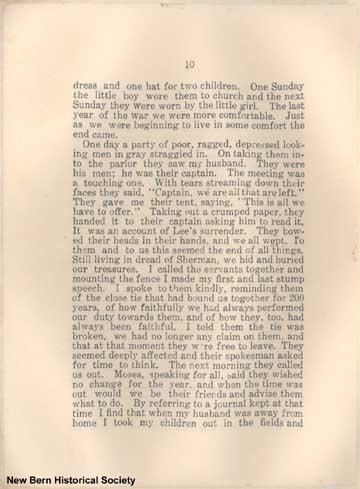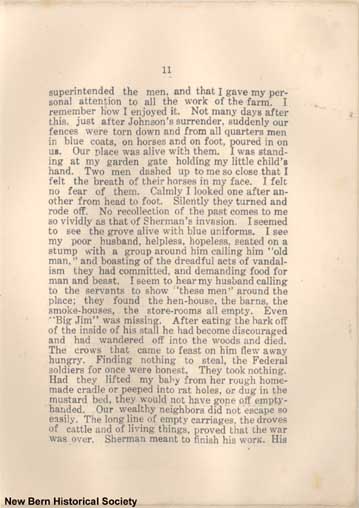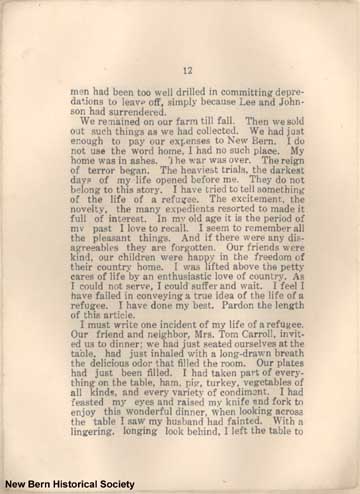
Historical Incidents by Mrs. F.C. Roberts,
Part 4
Click on the page images to view a more detailed image.

|
10 dress and one hat for two children. One Sunday the little boy wore them to church and the next Sunday they were worn by the little girl. The last year of the war we were more comfortable. Just as we were beginning to live in some comfort the end came. One day a party of poor, ragged, depressed looking men in gray straggled in. On taking them into the parlor they saw my husband. They were his men; he was their captain. The meeting was a touching one. With tears streaming down their faces they said, “Captain, we are all that are left.” They gave me their tent, saying, “This is all we have to offer.” Taking out a trumped paper, they handed it to their captain asking him to read it, It was an account of Lee’s surrender. They bowed their heads in their hands, and we all wept. To them and to us this seemed the end of all things. Still living in dread of Sherman, we hid and buried our treasures. I called the servants together and mounting the fence I made my first and last stump speech. I spoke to them kindly, reminding them of the close tie that had bound us togother for 200 years, of how faithfully we had always performed our duty towards them, and of how they, too, had always been faithful. I told them the tie was broken, we had no longer any claim on them, and that at that moment they were free to leave. They seemed deeply affected and their spokesman asked for time to think. The next morning they called us out. Moses, speaking for all, said they wished no change for the year, and when the time was out would we be their friends and advise them what to do. By referring to a journal kept at that time I find that when my husband was away from home I took my children out in the fields and
|
||
 |
11 superintended the men, and that I gave my personal attention to all the work of the farm. I remember how I enjoyed it. Not many days after this, just after Johnson's surrender, suddenly our fences were torn down and from all quarters men in blue coats, on horses and on foot, poured in on us. Our place was alive with them. I was standing at my garden gate holding my little child's hand. Two men dashed up to me so close that I felt the breath of their horses in my face. I felt no fear of them. Calmly I looked one after another from head to foot. Silently they turned and rode off. No recollection of the past comes to me so vividly as that of Sherman's invasion. I seemed to see the grove alive with blue uniforms. I see my poor husband, helpless, hopeless, seated on a stump with a group around him calling him "old man," and boasting of the dreadful acts of vandalism they had committed, and demanding food for man and beast. I seem to hear my husband calling to the servants to show "these men" around the place; they found the hen-house, the barns, the smoke-houses, the store-rooms all empty. Even "Big Jim" was missing. After eating the bark off of the inside of his stall he had become discouraged and had wandered off into the woods and died. The crows that came to feast on him flew away hungry. Finding nothing to steal, the Federal soldiers for once were honest. They took nothing. Had they lifted my baby from her rough homemade cradle or peeped into rat holes, or dug in the mustard bed, they would not have gone off empty-handed. Our wealthy neighbors did not escape so easily. The long line of empty carriages, the droves of cattle and of living things, proved that the war was over. Sherman meant to finish his work. His
|
||
 |
12 men had been too well drilled in committing depredations to leave off, simply because Lee and Johnson had surrendered. We remained on our farm till fall. Then we sold out such things as we had collected. We had just enough to pay our expenses to New Bern. I do not use the word home, I had no such place. My home was in ashes. The war was over. The reign of terror began. The heaviest trials, the darkest days of my life opened before me. They do not belong to this story. I have tried to tell something of the life of a refugee. The excitement, the novelty, the many expedients resorted to made it full of interest. In my old age it is the period of my past I love to recall. I seem to remember all the pleasant things. And if there were any disagreeables they are forgotten. Our friends were kind, our children were happy in the freedom of their country home. I was lifted above the petty cares of life by an enthusiastic love of country. As I could not serve, I could suffer and wait. I feel I have failed in conveying a true idea of the life of a refugee. I have done my best. Pardon the length of this article. I must write one incident of my life of a refugee. Our friend and neighbor, Mrs. Tom Carroll, invited us to dinner; we had just seated ourselves at the table, had just inhaled with a long-drawn breath the delicious odor that filled the room. Our plates had just been filled. I had taken part of everything on the table, ham, pig, turkey, vegetables of all kinds, and every variety of condiment. I had feasted my eyes and raised my knife and fork to enjoy this wonderful dinner, when looking across the table I saw my husband had fainted. With a lingering, longing look behind, I left the table to
|
||
| Pages 1 through 3 | Pages 4 through 6 | Pages 7 through 9 | Pages 10 through 12 |
| Pages 13, 14 and end pages | |||
Return to:
Craven County Digital History Exhibit
Return to: New Bern Historical Society Section of
Digital History Exhibit
Return to:
Kellenberger Room
Images scanned by John B. Green, III. Text prepared by
John B. Green, III and Victor T. Jones, Jr.
This page last edited on
August 21, 2018.



